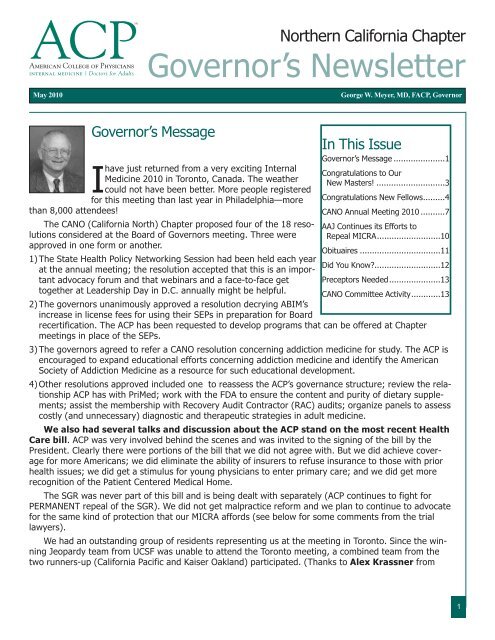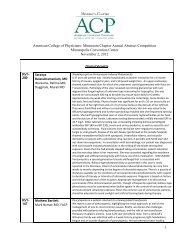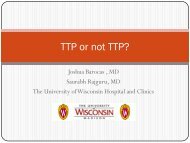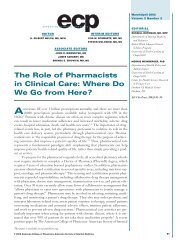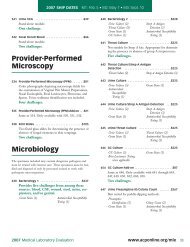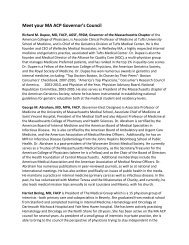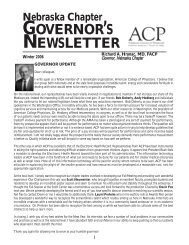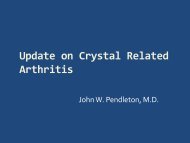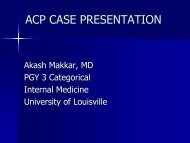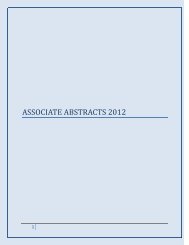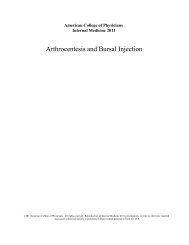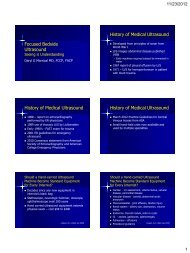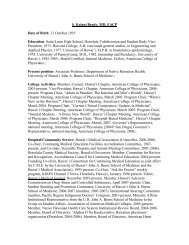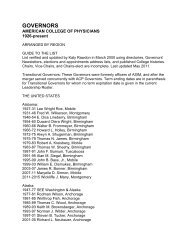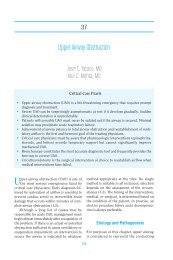BG9084-CANO-May 2010:Layout 1.qxd - American College of ...
BG9084-CANO-May 2010:Layout 1.qxd - American College of ...
BG9084-CANO-May 2010:Layout 1.qxd - American College of ...
You also want an ePaper? Increase the reach of your titles
YUMPU automatically turns print PDFs into web optimized ePapers that Google loves.
Governor’s Newsletter<br />
<strong>May</strong> <strong>2010</strong> George W. Meyer, MD, FACP, Governor<br />
Governor’s Message<br />
Ihave just returned from a very exciting Internal<br />
Medicine <strong>2010</strong> in Toronto, Canada. The weather<br />
could not have been better. More people registered<br />
for this meeting than last year in Philadelphia—more<br />
than 8,000 attendees!<br />
The <strong>CANO</strong> (California North) Chapter proposed four <strong>of</strong> the 18 resolutions<br />
considered at the Board <strong>of</strong> Governors meeting. Three were<br />
approved in one form or another.<br />
1) The State Health Policy Networking Session had been held each year<br />
at the annual meeting; the resolution accepted that this is an important<br />
advocacy forum and that webinars and a face-to-face get<br />
together at Leadership Day in D.C. annually might be helpful.<br />
Northern California Chapter<br />
In This Issue<br />
Governor’s Message .....................1<br />
Congratulations to Our<br />
New Masters! ............................3<br />
Congratulations New Fellows.........4<br />
<strong>CANO</strong> Annual Meeting <strong>2010</strong> ..........7<br />
AAJ Continues its Efforts to<br />
Repeal MICRA..........................10<br />
Obituaires .................................11<br />
Did You Know?...........................12<br />
Preceptors Needed.....................13<br />
<strong>CANO</strong> Committee Activity............13<br />
2) The governors unanimously approved a resolution decrying ABIM’s<br />
increase in license fees for using their SEPs in preparation for Board<br />
recertification. The ACP has been requested to develop programs that can be <strong>of</strong>fered at Chapter<br />
meetings in place <strong>of</strong> the SEPs.<br />
3) The governors agreed to refer a <strong>CANO</strong> resolution concerning addiction medicine for study. The ACP is<br />
encouraged to expand educational efforts concerning addiction medicine and identify the <strong>American</strong><br />
Society <strong>of</strong> Addiction Medicine as a resource for such educational development.<br />
4) Other resolutions approved included one to reassess the ACP’s governance structure; review the relationship<br />
ACP has with PriMed; work with the FDA to ensure the content and purity <strong>of</strong> dietary supplements;<br />
assist the membership with Recovery Audit Contractor (RAC) audits; organize panels to assess<br />
costly (and unnecessary) diagnostic and therapeutic strategies in adult medicine.<br />
We also had several talks and discussion about the ACP stand on the most recent Health<br />
Care bill. ACP was very involved behind the scenes and was invited to the signing <strong>of</strong> the bill by the<br />
President. Clearly there were portions <strong>of</strong> the bill that we did not agree with. But we did achieve coverage<br />
for more <strong>American</strong>s; we did eliminate the ability <strong>of</strong> insurers to refuse insurance to those with prior<br />
health issues; we did get a stimulus for young physicians to enter primary care; and we did get more<br />
recognition <strong>of</strong> the Patient Centered Medical Home.<br />
The SGR was never part <strong>of</strong> this bill and is being dealt with separately (ACP continues to fight for<br />
PERMANENT repeal <strong>of</strong> the SGR). We did not get malpractice reform and we plan to continue to advocate<br />
for the same kind <strong>of</strong> protection that our MICRA affords (see below for some comments from the trial<br />
lawyers).<br />
We had an outstanding group <strong>of</strong> residents representing us at the meeting in Toronto. Since the winning<br />
Jeopardy team from UCSF was unable to attend the Toronto meeting, a combined team from the<br />
two runners-up (California Pacific and Kaiser Oakland) participated. (Thanks to Alex Krassner from<br />
1
2<br />
Kaiser and Robert Wong and Matt Reimert from CPMC). We had several posters in competition during<br />
the meeting (see photos below). If I missed a poster it was because I had meeting conflicts during<br />
the poster competitions; I missed the Jeopardy competition for the same reason.<br />
Unfortunately, I was unable to attend many educational sessions but one pearl I came away with<br />
that is important for internists and those <strong>of</strong> us subspecializing in GI and Cardiology is that <strong>of</strong> the interaction<br />
<strong>of</strong> PPI’s and Plavix. One presentation suggested that the data that have come out since the initial<br />
publication do not support the allegation that PPI’s inhibit the effect <strong>of</strong> Plavix enough to discontinue<br />
the PPI: it has been suggested, however, that pantoprazole may have less <strong>of</strong> an effect than the others.<br />
We had four <strong>of</strong> our Chapter members honored with advancement to MACP (see below for<br />
their brief bios); although we had more than 40 new FACP’s this year most are waiting to participate in<br />
the annual meeting next year in San Diego (April 7-9, 2011).<br />
Thanks to those <strong>of</strong> you who sent in a supplement to your dues last year. It helped keep<br />
the cost <strong>of</strong> the annual meeting down so we did not have to charge our members to attend. This year<br />
we are asking the supplement to go to recruitment efforts, particularly for those in transition to practice.<br />
There will be a reception and wine tasting in Oakland in early June for members.<br />
Finally, I would like to invite you all to the <strong>CANO</strong> annual meeting in San Francisco at<br />
the Parc 55 Hotel on 19-21 November <strong>2010</strong>. This year the Chapter is running our meeting in conjunction<br />
with the California Chapter <strong>of</strong> the Society <strong>of</strong> General Internal Medicine (SGIM). There will be a<br />
nominal charge <strong>of</strong> $100 for members <strong>of</strong> the <strong>CANO</strong> Chapter since that is the cost the SGIM Chapter<br />
charges for its meeting. If you register you will have access to both meetings. Our program committee<br />
(see below) led by Suzanne Meyer, FACP, and Margaret Fang, FACP, promises an exciting meeting<br />
focused on women’s health and some <strong>of</strong> the new controversies over such topics as breast cancer<br />
and cervical cancer screening. On Friday we will, once again, run a preparation for Board review;<br />
Kelley Skeff will do a reprise <strong>of</strong> his “Teaching Teachers to Teach” for Chief Residents and Chief<br />
Residents-elect; and Steve Roey will again <strong>of</strong>fer his LEADership introduction on Friday afternoon. See<br />
below for more information.<br />
MY GOALS AS GOVERNOR<br />
When I became governor and even before I set some goals for my four- year term. Here is my<br />
assessment <strong>of</strong> progress the first year:<br />
1. Visit a different area each month each year: In 2009 I have visited the following residency programs:<br />
Stanford, UCD, Kaiser Oakland, Kaiser Santa Clara, and Kaiser San Francisco. I have also visited St<br />
Mary’s, CPMC, San Joaquin, and UCSF in Fresno.<br />
I have visited Fresno, Eureka, Redding, and Jackson, and I am hoping to get to Monterey and Santa<br />
Cruz this summer<br />
2. Give an annual meeting without pharmaceutical support: We have continued to do this for the past<br />
four years.<br />
3. Get California to pass a bill covering retired volunteer physicians for medical malpractice: This past<br />
January the Medical Board had a conference on this topic. There is currently a bill pending – SB 1031<br />
(Corbett) Volunteer Insured Physician (VIP) Program<br />
4. Clean up the membership list: an ongoing struggle<br />
5. Get e-mail addresses for members: an ongoing struggle; we are still 1000 members short <strong>of</strong> capturing<br />
all e-mail addresses (4700 total).<br />
6. Encourage different residency programs to lead the <strong>CANO</strong> annual meetings: perhaps not a good<br />
goal?<br />
7. Try to have meetings in different locations to increase participation: Held the 2009 meeting in<br />
Sacramento which was well attended. Exploring other locations including Palo Alto, Monterey and
Fresno – opinions? suggestions?<br />
8. Increase participation by residents: by giving the meeting with the California Chapter <strong>of</strong> Society for<br />
General Internal Medicine in <strong>2010</strong> we are improving.<br />
9. Work on the Northern California website: still to do<br />
Congratulations to Our New Masters!<br />
M. Eric Gershwin<br />
Dr Gershwin is Distinguished Pr<strong>of</strong>essor <strong>of</strong> Medicine in the Division <strong>of</strong> Rheumatology/Allergy and<br />
Clinical Immunology, University <strong>of</strong> California at Davis. He is also the Jack and Donald Chia Pr<strong>of</strong>esssor <strong>of</strong><br />
Medicine, Chief <strong>of</strong> the Division and Director <strong>of</strong> the Allergy-Clinical Immunology Program. He is considered<br />
an outstanding clinical investigator whose research has significantly advanced understanding <strong>of</strong><br />
the autoimmune disease primary biliary cirrhosis and greatly improved quality and standards for<br />
patients with this disorder. He has published over 50 books and monographs, over 700 experimental<br />
papers, and several hundred other shorter contributions to the medical literature, and he has 10<br />
patents. Dr. Gershwin holds lead editorial roles in three allergy/immunology journals and won the<br />
AESKU prize given by AESKU DIAGNOSTICS for a lifetime contribution in autoimmunity. He received an<br />
honorary doctorate from the University <strong>of</strong> Athens for a lifetime contribution in immunology. He has<br />
been an ACP advisor on alternative care in immunology and has lectured at Northern California at<br />
Northern California Chapter meetings<br />
Ralph I. Horwitz<br />
Dr Horwitz is Chair <strong>of</strong> the Department <strong>of</strong> Medicine at Stanford University. Previously he held positions<br />
<strong>of</strong> Dean <strong>of</strong> the School <strong>of</strong> Medicine at Case Western Reserve University and Chair <strong>of</strong> the<br />
Department <strong>of</strong> Internal Medicine at Yale University. He is known for his clinical research enhancing the<br />
understanding <strong>of</strong> the "evidence" in evidence-based medicine and his commitment to excellence in general<br />
clinical medicine. He was co-director <strong>of</strong> the Robert Wood Johnson Clinical Scholars Program for 25<br />
years; served as Chairman <strong>of</strong> the Board <strong>of</strong> Internal Medicine where he negotiated agreement with ACP<br />
on key issues; and sat on committees or advisory boards for the Institute <strong>of</strong> Medicine, the Association<br />
<strong>of</strong> Pr<strong>of</strong>essors <strong>of</strong> Medicine, and the National Institutes <strong>of</strong> Health. Dr. Horwitz has had extensive grant<br />
support relating to integrating health care quality principles into medical education and has published<br />
over 180 peer-reviewed articles, some in the Annals <strong>of</strong> Internal Medicine, and nearly 150 other publications.<br />
He worked with several ACP governors to enhance ACP's presence at Yale University.<br />
Talmadge E. King, Jr<br />
Dr King is Chair <strong>of</strong> the Department <strong>of</strong> Medicine and Julius R. Krevans Distinguished Pr<strong>of</strong>essor in<br />
Internal Medicine at University <strong>of</strong> California San Francisco. Past positions include Chief <strong>of</strong> Medical<br />
Services, San Francisco General Hospital, and Executive Vice President for Clinical Affairs, National<br />
Jewish Center for Immunology and Respiratory Medicine. Dr. King has published more than 130 peerreviewed<br />
papers, contributed to or authored numerous textbooks and other publications, and served on<br />
several editorial boards, including Annals <strong>of</strong> Internal Medicine. He has received numerous honors and<br />
awards, including the Trudeau Medal, the highest honor <strong>of</strong> the <strong>American</strong> Thoracic Society; and election<br />
to the Institute <strong>of</strong> Medicine and the Association <strong>of</strong> <strong>American</strong> Physicians. He has served as President <strong>of</strong><br />
the <strong>American</strong> Thoracic Society and on the Executive Committee <strong>of</strong> the <strong>American</strong> Board <strong>of</strong> Internal<br />
Medicine. In addition to his work with Annals <strong>of</strong> Internal Medicine, he served on the MKSAP Pulmonary<br />
and Critical Care Medicine Subcommittee.<br />
3
4<br />
Neil R. Powe:<br />
Dr Powe is Chief <strong>of</strong> the Medical Service at San Francisco General Hospital, the Constance B. W<strong>of</strong>sy<br />
Distinguished Pr<strong>of</strong>essor, and Vice Chair <strong>of</strong> Medicine at the University <strong>of</strong> California San Francisco. Dr<br />
Powe has published over 300 manuscripts involving clinical epidemiology, health services research, and<br />
patient outcomes research, particularly in chronic kidney disease. Dr. Powe was Chair <strong>of</strong> the National<br />
Advisory Committee for Healthcare Research and Quality. He received the Garabed Eknoyan Award<br />
from the National Kidney Foundation, the John M. Eisenberg National Award for Career Achievement in<br />
Research from the Society <strong>of</strong> General Internal Medicine, and the Distinguished Educator Award from<br />
the Association for Clinical Research Training. Prior to joining UCSF, Dr. Powe served as the James Fries<br />
University Distinguished Pr<strong>of</strong>essor <strong>of</strong> Medicine and Director <strong>of</strong> the Welch Center at Johns Hopkins<br />
University. Dr. Powe served as a representative to the <strong>American</strong> Medical Association for ACP from 1994-<br />
1997.<br />
Congratulations New Fellows!<br />
Arlina Ahluwalia, MD, FACP, Menlo Park<br />
Neera Ahuja, MD, FACP, Stanford<br />
Kyaw Aung, MD, FACP, Vacaville<br />
Nathan M. Bass, MD, FACP, San Francisco<br />
James F. Baxter, MD, FACP, Menlo Park<br />
Amerish B. Bera, MD, FACP, Elk Grove<br />
Ingrid J. Block-Kurbisch, MD, FACP, San Francisco<br />
Terry E. Hill, MD, FACP, Oakland<br />
Ranjit S. Hundal, MBBS, FACP, Vallejo<br />
Andrew Hwang, MD, FACP, Campbell<br />
Catherine Bree Johnston, MD, FACP, San Francisco<br />
Clarissa M. Johnston, MD, FACP, San Francisco<br />
Jessica Keane, MD, FACP, San Rafael<br />
Wendi A. Knapp, MD, FACP, Aptos<br />
Nikheel S. Kolatkar, MD, FACP, San Francisco<br />
Darin A. Latimore, MD, FACP, Fair Oaks<br />
Benjamin P. Lee, MD FACP, Folsom<br />
Eugene Lee, MD, FACP, San Francisco<br />
Jenelyn C. Lim, MD, FACP, San Jose<br />
John F. Macmillan, Jr., MD, FACP, Sacramento<br />
Joseph L. Melendres, MD, FACP, Sacramento<br />
John E. Moran, MD, FACP, Burlingame<br />
Maung M. Myint, MD, FACP, Hercules<br />
Meg D. Newman, MD, FACP, San Francisco<br />
Mary G. Patton, MD, FACP, Oakland<br />
Kwan C. Pun, MD FACP, Palo Alto
Eva S. Quiroz, MD, FACP, Fremont<br />
Sumant R. Ranji, MD, FACP, San Francisco<br />
Kristen A. Robinson, MD, FACP, Sacramento<br />
Brigitte M. Schiller-Moran, MD, FACP, Palo Alto<br />
Brian M. Sebastian, MD, FACP, Sonoma<br />
Michelle Shute, MD, FACP, Berkeley<br />
Neil A. Solomon, MD, FACP, Oakland<br />
Sabine M. Steegers, MD, FACP, Oakland<br />
Michael D. Stein, MD, FACP, Campbell<br />
John Stoner, III MD, FACP, Menlo Park<br />
Upasna M. Swift, MBBS, FACP, Alameda<br />
Michael A. Tom, DO, FACP, Fresno<br />
Mohiuddin Waseem, MBBS, FACP, Modesto<br />
Ronald M. Witteles, MD, FACP, Los Altos<br />
Brian Sebastian, Sandy Barbour, George Meyer, Jennifer Osborn, Pamela Prescott, Donald Kitt,<br />
Shagufta Yasmeen, Mini Swift<br />
5
6<br />
<strong>CANO</strong> Associates do well at national competition<br />
Helen Chow, MD<br />
Finalists: Clinical Vignettes<br />
Adelaida C. Alfiler MD<br />
Abeer W Kaldas, MBBCh Elizabeth Penumaka, MD, Garmen A. Woo, MD<br />
Rosalio Rubio, MD Anna Maguire, MD<br />
Finalists: Research<br />
Omid Bakhtar, DO Nicole White, DO<br />
Abeer Kaldas, Alameda County Medical Center<br />
Ted Rose, Sabine Steegers, Nicole White, Mini Swift<br />
Helen Chow and Sabine Steegers, Alameda County<br />
Medical Center<br />
Adelaida Alfiler and Sabine Steegers, Alameda<br />
County Medical Center
Elizabeth Penumaka, Sabine Steegers, Abeer Kaldas, Kathy<br />
Matikonis, George Meyer, Helen Chow, Adelaida Alfiler, Yolanda<br />
Cuadros<br />
Rosalio Rubio and Kathy Matikonis<br />
Suzanne Meyer, MD FACP, graduated from UC Davis Medical School,<br />
class <strong>of</strong> 1981. After an Internal Medicine Residency at Santa Clara Valley<br />
Medical Center she spent six years in private practice <strong>of</strong> general internal<br />
medicine in a rural community near Modesto and, since 1992, has been on<br />
the teaching faculty for Stanislaus Family Practice Residency. She teaches<br />
residents in the ICU and on the inpatient wards and has her own continuity<br />
clinics through the county health system. She says it’s great work and she<br />
highly recommends this as a career path for any internist who wants to<br />
teach and live in a smaller community. She holds a faculty position at UC<br />
Davis as a Clinical Pr<strong>of</strong>essor. She and Dr. Fang are co-program directors for<br />
the <strong>2010</strong> Northern California Chapter meeting in San Francisco on 19-21<br />
November at the Parc 55 Hotel.<br />
<strong>CANO</strong> Annual Meeting <strong>2010</strong><br />
This year’s meeting is a joint effort <strong>of</strong> SGIM and<br />
ACP <strong>CANO</strong>. The co-chairs stress the importance <strong>of</strong><br />
medical pr<strong>of</strong>essional societies (including hospital<br />
medicine!) to find shared interests and synergies;<br />
our collaborative efforts can enrich the experience<br />
<strong>of</strong> attendees.<br />
7
8<br />
Margaret C. Fang, MD, MPH is an Assistant Pr<strong>of</strong>essor <strong>of</strong> Medicine at<br />
the University <strong>of</strong> California, San Francisco (UCSF) in the Division <strong>of</strong> Hospital<br />
Medicine and Medical Director <strong>of</strong> the UCSF Anticoagulation Clinic. She is a<br />
graduate <strong>of</strong> Northwestern University’s Feinberg School <strong>of</strong> Medicine, completed<br />
residency training in internal medicine at the Beth Israel Deaconess<br />
Medical Center, and subsequently obtained a Masters <strong>of</strong> Public Health at the<br />
Harvard School <strong>of</strong> Public Health during a general medicine research fellowship<br />
at the Massachusetts General Hospital. Dr. Fang devotes the majority <strong>of</strong><br />
her time to clinical research and hospital-based medicine, studying how to<br />
optimize the use <strong>of</strong> anticoagulants in clinical care. She serves as a writing<br />
member <strong>of</strong> the <strong>American</strong> <strong>College</strong> <strong>of</strong> Chest Physicians Guidelines on<br />
Antithrombotic Therapy, an Assistant Editor <strong>of</strong> the Journal <strong>of</strong> Hospital<br />
Medicine, and a Deputy Editor <strong>of</strong> the Journal <strong>of</strong> General Internal Medicine.<br />
Dr. Fang has been actively involved in the <strong>American</strong> <strong>College</strong> <strong>of</strong> Physicians, the Society <strong>of</strong> General<br />
Internal Medicine, and the Society <strong>of</strong> Hospital Medicine and is the current President-elect <strong>of</strong> the<br />
California Society <strong>of</strong> General Internal Medicine.<br />
NORTHERN CALIFORNIA CHAPTER ACP and<br />
THE CALIFORNIA SOCIETY OF GENERAL INTERNAL MEDICINE<br />
<strong>2010</strong> ANNUAL MEETING<br />
November 19-21<br />
Friday, November 19<br />
7 AM Registration/Continental Breakfast<br />
8 AM – 10 AM Self-Evaluation Program (SEP) for Maintenance <strong>of</strong> Certification<br />
9 AM – 4:30 PM Chief Residents’ Leadership Training<br />
Kelley Skeff, MD, MACP<br />
10:00 – Noon Self-Evaluation Program (SEP) for Maintenance <strong>of</strong> Certification<br />
Noon Buffet Lunch<br />
1 – 5 PM LEAD Program (Leadership Enhancement and Development)<br />
Steven C. Roey, MD, FACP<br />
1:30 – 3:30 PM Self-Evaluation Program (SEP) for Maintenance <strong>of</strong> Certification:<br />
3:30 – 5:30 PM Self-Evaluation Program (SEP) for Maintenance <strong>of</strong> Certification:<br />
Saturday, November 20<br />
7 AM Registration/Continental Breakfast<br />
7:55 – 8:05 AM Welcome<br />
George W Meyer, MD, FACP, Governor, No. California Chapter ACP<br />
Margaret Fang, MD, FACP, President-elect, SGIM
8:05 – 8:45 AM Keynote Address: Louise Walter, MD, FACP, screening guidelines in women,<br />
particularly focusing on new mammography screening guidelines and<br />
controversies.<br />
8:45 - 9:15 AM Global Health Issues in Women: Ana Maria Lopez, MD, MPH, FACP,<br />
Pr<strong>of</strong>essor <strong>of</strong> Medicine and Pathology, Director Arizona Telemedicine<br />
Program, University <strong>of</strong> Arizona<br />
9:15 – 10:15 AM Updates in Women’s Health: Judith Walsh, MD, FACP (UCSF) and<br />
Dr. Amparo Villablanca (UC Davis)<br />
10:15 – 11 AM Break: Visit Exhibits<br />
11 AM – Noon Concurrent sessions: Oral research presentations<br />
CPMC Images in Medicine: Clinical Problem Solving<br />
Paul Aronowitz, MD, FACP<br />
12:15 PM Awards Luncheon<br />
ACP Representative: Ana Maria Lopez, MD, MPH, FACP, Governor,<br />
Arizona Chapter<br />
SGIM Representative: Washington Update: Rich Trachtman, JD<br />
2:30 PM Poster Viewing and Judging<br />
Career Development session (to be organized by Terrie Mendelson, MD, FACP<br />
St. Mary’s Medical Center<br />
3:30 – 4 PM Break (Light snacks served)<br />
4 – 6 PM Medical Jeopardy<br />
R. Jeffrey Kohlwes, MD, FACP, Moderator<br />
6:15 PM Welcoming Reception<br />
Poster Winners Announced; Raffle Drawing (must be present to win)<br />
Sunday, November 21<br />
7 AM Registration/Continental Breakfast<br />
8 AM Hands-on Skills Concurrent Workshops<br />
Communication Skills Workshop: Charlie Goldberg, MD (current California<br />
SGIM president), David Hatem, MD (University <strong>of</strong> Massachusetts) and<br />
Preetha Basaviah, MD (Stanford)<br />
Hand-held Ultrasound for the Internist: Elizabeth Kwan, MD (UCSF<br />
Division <strong>of</strong> Emergency Medicine) and Michelle Mourad, MD, Associate<br />
Member (UCSF Division <strong>of</strong> Hospital Medicine)<br />
Practice Management: Coding for Success – Appropriate Documentation<br />
Arthur N. Lurvey, MD, FACP, FACE<br />
9
10<br />
9:30 – 10 AM Break<br />
10 – 11 AM California Update and Chapter Business Meeting<br />
George W Meyer, MD, FACP<br />
State Legislative Update<br />
Tom Riley, Legislative Consultant<br />
10-11AM SGIM Business Meeting<br />
11 AM – 12:30 PM Hand-held Ultrasound for the Internist: Elizabeth Kwan, MD and<br />
Michelle Mourad, MD, Associate Member<br />
Practice Management: Coding for Success: Responding to<br />
Challenges//Fighting Back<br />
Arthur Lurvey, MD, FACP, FACE<br />
12:30 PM Adjourn<br />
Please Note: There will be no printed meeting program or registration material mailed this year—<br />
the program and registration information will be posted online by mid-June, so watch your email for the<br />
announcement.<br />
AAJ Continues its Efforts to Repeal MICRA<br />
Below is a portion <strong>of</strong> a letter from the plaintiff trial lawyers, the <strong>American</strong> Association for Justice<br />
(AAJ), formerly the Association <strong>of</strong> Trial Lawyers <strong>of</strong> America (ATLA): Please note that they are not going<br />
to give up in trying to repeal MICRA. In order to fight this battle we need to maximize the number <strong>of</strong><br />
members in the ACP!!!<br />
“Here are some <strong>of</strong> the highlights <strong>of</strong> AAJ’s efforts and the obstacles we overcame:<br />
• In the House, AAJ defeated tort reform amendments that were <strong>of</strong>fered in all three committees that<br />
amended the original bill.<br />
• As the House voted on the health care bill in October, AAJ defeated the GOP’s malpractice cap<br />
“motion to recommit,” the only opportunity they had to kill the entire bill. Former AAJ Board Member,<br />
Rep. Bruce Braley, deserves special recognition for speaking in opposition to the motion amidst a vitriolic<br />
attack against trial lawyers.<br />
• In the Senate, 28 tort reform amendments were defeated in the two committees that marked up the<br />
bill.<br />
• On the Senate floor, AAJ decisively defeated a cap on attorney’s fees by a bipartisan 32-66 vote. Many<br />
<strong>of</strong> you spent the weekend emailing and calling your members <strong>of</strong> Congress.<br />
• AAJ unveiled one <strong>of</strong> its largest media campaigns ever – 98000Reasons.org - to educate the public and<br />
lawmakers about the 98,000 deaths that occur every year from preventable medical errors.<br />
• In addition to print, radio and online advertising, AAJ bought all the billboard space in the Union<br />
Station subway for the month <strong>of</strong> December, specifically targeting Senate staffers who use that station<br />
for their daily commute.<br />
• AAJ staff, <strong>of</strong>ficers, and members did hundreds <strong>of</strong> interviews and letters to the editor, reaching print<br />
and broadcast outlets nationwide. Thousands <strong>of</strong> messages were sent to members <strong>of</strong> Congress<br />
through AAJ’s grassroots portal.<br />
You may also remember that back in September, President Obama called on the Department <strong>of</strong><br />
Health and Human Services to approve $25 million in planning grants and demonstration projects that<br />
would reduce the number <strong>of</strong> medical errors and decrease liability costs. At this time, we are still waiting<br />
to hear which planning grants and demonstration projects will receive a federal grant.
While AAJ was fighting tort reform in the halls <strong>of</strong> Congress, states were also waging their own battles.<br />
In the last several months, with the help <strong>of</strong> the Center for Constitutional Litigation, caps in Illinois<br />
and Georgia and Washington’s certificate <strong>of</strong> merit were declared unconstitutional – tremendous victories<br />
for patients in those states. (to say nothing about Trial Lawyers, GM)<br />
That health care has passed unfortunately does not mean our fight is over. Undoubtedly, lawmakers<br />
will need to revisit health care in the months and years to come, and that may lead to future battles on<br />
medical malpractice. We will remain vigilant and ensure the voices <strong>of</strong> patients (and Trial Lawyers, GM)<br />
are heard.<br />
Whether reading the newspaper or watching C-SPAN, all <strong>of</strong> you saw the constant assault against<br />
trial lawyers and injured patients. Many opponents <strong>of</strong> these health care bills had no substantive solutions<br />
<strong>of</strong> their own, and in turn, levied attacks on our clients. It was distressing, but at the same time, it<br />
was our call-to-action. We knew that only AAJ could protect injured patients and ensure their rights<br />
wouldn’t be used as bargaining chips as the debate moved forward.<br />
That’s what we did, and it was a resounding success.<br />
Please share this message with trial lawyers who are not AAJ members and encourage them to join<br />
our ranks. We need the support <strong>of</strong> all who care about civil justice as we face the never-ending assault<br />
on trial lawyers and the families we represent, while also working to expand the rights <strong>of</strong> consumers<br />
and access to justice. With your support, AAJ will continue to protect your clients on Capitol Hill.”<br />
OBITUARIES<br />
Edgar Wayburn, a physician who joined the Sierra Club to take a burro trip and then went on to<br />
become a major figure in the conservation movement, leading campaigns that preserved more than<br />
100 million wild acres, died at age 103.<br />
The Sierra Club called Dr. Wayburn “the 20th-century John Muir,” referring to its founder, who preserved<br />
the Yosemite Valley. When President Bill Clinton awarded Dr. Wayburn the Presidential Medal<br />
<strong>of</strong> Freedom in 1999, he said Dr. Wayburn had “saved more <strong>of</strong> our wilderness than any other person<br />
alive.” “Legislators know that if Dr. Wayburn comes into your <strong>of</strong>fice, what might have been inconceivable<br />
at the beginning <strong>of</strong> the conversation is inevitable by the end <strong>of</strong> it,” Representative Nancy<br />
Pelosi told Sierra magazine in 1999. His case was as much moral as aesthetic. “In destroying wilderness,”<br />
he wrote in his autobiography, “we deny ourselves the full extent <strong>of</strong> what it means to be alive.”<br />
Dr. Wayburn had central roles in protecting 104 million acres <strong>of</strong> Alaskan wilderness; establishing<br />
and enlarging Redwood National Park and Point Reyes National Seashore in California; and starting the<br />
Golden Gate National Recreation Area in and around San Francisco.<br />
His methods were the old-fashioned ones <strong>of</strong> writing letters, raising money, commenting on environmental<br />
studies and attending public hearings. He was widely respected for the authority and persistence<br />
he brought to lobbying public <strong>of</strong>ficials, always s<strong>of</strong>tly, with a courtly Georgia accent.<br />
Dr. Wayburn helped transform the Sierra Club from the 3,000-member outing and skiing club he<br />
joined in 1939 into a powerful force in environmentalism today with 730,000 members. He served five<br />
one-year terms as president <strong>of</strong> the club in the 1960s and for many years was honorary president.<br />
Dr. Wayburn was born in Macon, Ga., on Sept. 17, 1906, and grew up devouring nature books. His<br />
mother was from San Francisco, and as a child he visited the city every summer. He graduated from the<br />
University <strong>of</strong> Georgia at 19 and from Harvard Medical School at 23 before returning to California to<br />
practice medicine. After wartime service in England as a doctor with the Army Air Forces, he returned<br />
to San Francisco and was elected to the executive committee <strong>of</strong> the local Sierra Club chapter and<br />
started its first conservation committee. As a physician who made house calls, Dr. Wayburn addressed<br />
his environmental mission mainly in the evenings and on weekends and vacations, never accepting<br />
remuneration.<br />
11
12<br />
He practiced medicine for more than 50 years; taught at the medical schools <strong>of</strong> the University <strong>of</strong><br />
California and Stanford University and was president <strong>of</strong> the San Francisco Medical Society. His many<br />
awards for conservation work included the Albert Schweitzer Prize for Humanitarianism in 1995.<br />
*******************************<br />
Bernard Silber, MD, <strong>of</strong> Atherton and Palo Alto, died March 20, <strong>2010</strong>, at age 98. He practiced<br />
Internal Medicine and Cardiology in Redwood City, and at Sequoia Hospital and Stanford University<br />
Medical Center. In addition to being a dedicated physician, Bernard was an expert calligrapher, a student<br />
<strong>of</strong> etymology and several languages--including Yiddish, his first language.<br />
Bernard Silber was born in 1911 in Baltimore, Maryland. He attended Baltimore City <strong>College</strong>, the<br />
University <strong>of</strong> Maryland, and the University <strong>of</strong> Chicago School <strong>of</strong> Medicine, 1936.<br />
Dr. Silber completed five years <strong>of</strong> medical residency, beginning in Pathology and Radiology, and<br />
finally focusing on Internal Medicine. During WWII Dr. Silber was a captain in the US Army, a Medical<br />
Officer stationed at Guadalcanal in the Solomon Islands, in Hawaii, and at the 3000-bed Dibble Army<br />
Hospital in Menlo Park.<br />
After the war Dr. Silber, along with four medical colleagues from Dibble Hospital, opened the<br />
Sequoia Medical Group in Redwood City. He continued to practice Internal Medicine and Cardiology<br />
until his retirement 24 years ago. When asked what kind <strong>of</strong> physician he was, he always answered, "an<br />
RD" – a real doctor. During his practice he frequently made medical house calls, and was beloved by his<br />
many patients on the S. F. Peninsula.<br />
As a physician he was an excellent diagnostician, and continued to keep abreast <strong>of</strong> the latest developments<br />
in medicine throughout his five-decade career. Early on he became interested in the relationship<br />
<strong>of</strong> diet, exercise, and smoking to heart disease, and preached a healthy lifestyle to all his patients.<br />
Dr. Bernard Silber was an uncommonly generous man with his family and friends, and with the many<br />
organizations he supported.<br />
Did You Know?<br />
9/11 Drill Down for Safety was created last year to improve readiness and resiliency, and lessen<br />
the devastating impact <strong>of</strong> disasters on individuals, their communities, and the Nation. The goal is to<br />
encourage individuals to conduct emergency drills at home, work and in their communities.<br />
The Safe America Foundation has joined with corporate partners, community leaders, and government<br />
agencies to be sure that <strong>American</strong>s practice being prepared. In the inaugural event last<br />
September, approximately 400,000 people participated and practiced what they would do in an emergency.<br />
We all recognize the importance <strong>of</strong> being better prepared now, in order to be better able to<br />
adapt to a hurricane, public health emergency, attack, or other situation as they arise.<br />
This year, the organizers also seek to test the collective ability <strong>of</strong> <strong>American</strong>s to simultaneously react<br />
using telephone and wireless devices. So, as part <strong>of</strong> the initiative this year, Safe America is also encouraging<br />
a national "texting drill." The goal is to have people make a quick ‘text’ to family members and<br />
others who would be important for them to reach in an emergency. It is becoming better understood<br />
that ‘texting’ may become the first form <strong>of</strong> communications in a disaster – replacing voice communications<br />
(which may not be generally available).<br />
Osteopathic Medical Board: Did you know that the State <strong>of</strong> California has a law that puts two<br />
naturopathic physicians on the Osteopathic Medical Board? Sen. Leland Yee has <strong>of</strong>fered a bill, SB 1050,<br />
to correct this situation. This bill would exclude those naturopathic doctors from the membership <strong>of</strong><br />
the board, thereby reducing the licensee membership <strong>of</strong> the board to five osteopathic physicians and<br />
surgeons. The bill would add two additional public members to the board and would require the Senate<br />
Committee on Rules and the Speaker <strong>of</strong> the Assembly to each appoint one public member.
Volunteerism: Did you know that California is one <strong>of</strong> only 17 States that have no laws that protect<br />
volunteer physicians from malpractice claims. In February 2008 Governor Schwarzenegger<br />
announced the establishment <strong>of</strong> a new State cabinet position, Secretary <strong>of</strong> Service and Volunteering.<br />
Current State law authorizes local government entities to provide insurance or indemnify volunteer<br />
physicians at free clinics but it does NOT require them to do so. The County <strong>of</strong> Sacramento does provide<br />
such coverage but other counties do not. In January <strong>2010</strong> the Medical Board <strong>of</strong> California had a<br />
hearing to discuss this issue. Sen. Ellen Corbett has proposed S.B. 1031 which will fix the issue for<br />
those <strong>of</strong> us who wish to practice as a volunteer but are no longer in practice as well as for those <strong>of</strong> us<br />
in practice who want to give time to those not covered by health insurance.<br />
Did you know that Amerish Bera, MD, FACP, Sacramento is running for Congress?<br />
PRECEPTORS NEEDED<br />
We have recently received a request from Dr Faroque Khan, MD, MACP who is now teaching in<br />
Saudi Arabia. He wants some <strong>of</strong> their better medical students to come to the U.S. for preceptorships in<br />
internal medicine <strong>of</strong>fices. The university in Saudi Arabia will negotiate to reimburse you for your time.<br />
Students would have their room and board covered by the program.<br />
If you have any interest in working with what could be a continuing relationship please let me know<br />
at geowmeyer1@earthlink.net. There may be a similar <strong>of</strong>fer for IM residents.<br />
<strong>CANO</strong> Committee Activity<br />
The Finance Committee has had several virtual meetings over the past year. We have created proposed<br />
guidelines for investments, arranged for an outside audit <strong>of</strong> the Chapter's financial situation, and<br />
discussed numerous issues relating to dues, the regional meeting, and our financial relationship with<br />
the national ACP.<br />
The Program Directors’ Committee has met twice over the past year. Our primary focus has been<br />
to explore ways to attract more Resident (Associate) members to the ACP, and have them remain active<br />
after completing their Residency. We have also discussed the new RRC-IM regulations that took effect<br />
July 1st, the challenge <strong>of</strong> work hours compliance, and ways to increase interest in Internal Medicine<br />
among internship applicants.<br />
A few updates for Associates from Lucy Kalanithi, MD, Western Zone representative, national<br />
Council <strong>of</strong> Associates:<br />
* A team <strong>of</strong> associate members from Northern California represented our chapter proudly in the<br />
national Doctor's Dilemma competition and IM<strong>2010</strong> in Toronto - Congratulations to Alex Krassner<br />
(Kaiser Permanente Oakland), Matt Reimert (California Pacific Medical Center) and Robert Wong<br />
(California Pacific Medical Center) on their hard work and depth <strong>of</strong> medical knowledge!<br />
* The Northern California annual meeting in November <strong>2010</strong> will include this jeopardy-style competition<br />
(the winning team will again advance to the national competition), a lively poster session, and a<br />
chance for residents and fellows to express their views and needs to their national Council <strong>of</strong><br />
Associates (COA) representative.<br />
* The national ACP Council <strong>of</strong> Associates is working on developing guidelines for physicians' use <strong>of</strong><br />
social media (e.g., Facebook and Twitter), establishing an ACP policy internship in Washington, D.C.,<br />
and providing support for associate member activities. Please feel free to contact Lucy Kalanithi<br />
(lgkalanithi@gmail.com) any time with ideas or questions.<br />
13
14<br />
* Finally, associates should be aware that with their ACP membership, they receive a substantial discount<br />
on MKSAP materials for internal medicine boards study, including many sample questions. It's<br />
never too early to start!<br />
CMA Letter to Blue Shield re CPPI<br />
RE: CALIFORNIA PHYSICIAN PERFORMANCE INITIATIVE<br />
Dear Messrs: Bodaken and Lansky:<br />
On behalf <strong>of</strong> the California Medical Association (CMA), I am writing to inform you that, effective<br />
immediately, we hereby terminate our participation with the California Physician Performance Initiative.<br />
We do so because we are deeply disturbed by the process and by Blue Shield <strong>of</strong> California’s insistence<br />
to move forward with publishing faulty data that will only serve to mislead patients and irreparably<br />
harm physicians’ personal and pr<strong>of</strong>essional reputation. What follows is the basis for our decision via<br />
policies adopted by our Board <strong>of</strong> Trustees (BOT). As you may know, CMA’s process to further review<br />
CPPI included establishment <strong>of</strong> a Quality Technical Advisory Committee (QTAC). Members <strong>of</strong> the QTAC<br />
included CMA physicians representing a wide variety <strong>of</strong> physician perspectives. Physicians in large<br />
group and solo practices who have dedicated large portions <strong>of</strong> their careers to improving the quality <strong>of</strong><br />
care delivered in California participated in this process. After three meetings, one with Pacific Business<br />
Group on Health (PBGH) and Blue Shield, the committee concluded that the goal and rationale <strong>of</strong> CPPI<br />
are inconsistent with the CPPI product. The QTAC concluded that many significant and unresolved<br />
issues remain, and that the CPPI product is a work in progress. Further, the QTAC has concluded that<br />
publication <strong>of</strong> the CPPI at this time will do more harm than good to California’s collective health care<br />
community—patients, physicians, and payors.<br />
As discussed below, these significant and unresolved issues include, but are not limited to, the following:<br />
1) Inaccurate financial claims data used by insurers for the CPPI may mislead patients in<br />
choosing or retaining physicians, irreparably harm a physician’s pr<strong>of</strong>essional and personal<br />
reputation, and may not necessarily address payor concerns about costs.<br />
Claims data is set up for billing, and not for quality measurement. One <strong>of</strong> the intended goals <strong>of</strong> CPPI<br />
is to provide patients with accurate information when choosing or retaining physicians because public<br />
websites (e.g., Yelp) and word-<strong>of</strong>-mouth referrals are unreliable. Based on the experience <strong>of</strong><br />
physicians with the CPPI and QTAC’s careful review <strong>of</strong> the CPPI, the QTAC concluded that the CPPI<br />
will not necessarily present more accurate information to patients because the claims data used are<br />
inherently flawed. Indeed, the CPPI branding and messaging may be different from Yelp, but the end<br />
result will likely be the same—unreliable information to patients.<br />
2) Inadequate consideration <strong>of</strong> patient adherence to recommended physician care may<br />
also discourage physicians to continue seeing non-compliant patients to avoid negative<br />
CPPI scores1. Under the current CPPI model, physicians are 100% accountable even if a patient<br />
refuses to adhere to recommended care. There are strong sentiments from physicians that they<br />
should not be penalized for something that is beyond their control as submitted by physicians who<br />
participated in the CPPI. For example, one physician declined to pursue recommending a<br />
colonoscopy to his bed-ridden dying patient; 2) another patient delayed a recommended procedure<br />
because she lost her job; 3) some patients may forgo recommended care because they are on vacation,<br />
out <strong>of</strong> the country, or they dropped their health coverage; and 4) other patients by choice may<br />
simply refuse to adhere to certain procedures (like colonoscopy). In sum, CPPI fails to adjust for<br />
patient behavior. This may have the unintended consequence <strong>of</strong> creating a disincentive to care for<br />
non-compliant patients to avert negative CPPI scores.<br />
1 CMA recognizes that CPPI included patient adherence to a recommended physician procedure in cycle 4, but it has since decided that<br />
such consideration will be excluded moving forward. 2 Journal <strong>of</strong> <strong>American</strong> Medical Association: “Measuring Physicians’ Quality and<br />
Performance.” (December 2009)
3) Incorrect patient attribution dilutes the quality <strong>of</strong> care the physician provided to a<br />
patient, and is inefficient because it may actually lead to duplicative care. For instance, in<br />
a Preferred Provider Organization (PPO) setting, a patient may see an out-<strong>of</strong>-network, non-contracting<br />
OBGYN for a pap smear, and that patient may not inform her regular in-network, contracting primary<br />
care physician about the pap smear. Under the current CPPI rules, the in-network physician is<br />
attributed the patient and is penalized because there are no pap smear claims data submitted to the<br />
health plan. Also, the out-<strong>of</strong>-network, non-contracting physician will not receive the credit because<br />
he has no contract with the payers. This example is troubling because it may compel the primary<br />
care physician to order another pap smear to avoid receiving a low CPPI score. Duplicative care is<br />
contrary to the efforts <strong>of</strong> payers to control the cost <strong>of</strong> healthcare.<br />
4) Inappropriate use <strong>of</strong> quality metrics and inclusion <strong>of</strong> problematic measures. Physicians<br />
are particularly concerned with the lack <strong>of</strong> efficacy <strong>of</strong> the quality measurements used by CPPI. These<br />
measures do not capture patient outcomes and <strong>of</strong>fer only a cursory view <strong>of</strong> the overall care provided<br />
by a physician. To quote the Journal <strong>of</strong> <strong>American</strong> <strong>of</strong> Medical Association, “[by] relying on highly<br />
focused quality metrics one at a time [which CPPI does], [we] are viewing care through a tiny keyhole.2<br />
Furthermore, although CPPI committed to exclude colonoscopy and heart failure from CPPI in<br />
cycle 4 because <strong>of</strong> the many flaws associated with such measures, there is lingering concern about<br />
other measures that remain problematic. For example, physicians were penalized for not recommending<br />
cervical cancer screening tests to patients who had undergone hysterectomies.<br />
5) Insufficient patient sample size remains unresolved. The CPPI uses insurer commercial data<br />
from Anthem Blue Cross, Blue Shield, and United Health Care. It excludes administrative services<br />
only (ASO) data, public payor data from Medi-Cal and Medicare, and other private carriers like Aetna<br />
and Cigna. Thus, many physicians remain skeptical that CPPI has enough patients in any specific<br />
group to support statistically valid measurement. It is important to note that the Journal <strong>of</strong> <strong>American</strong><br />
Medical Association article discussed in the previous bullet above raised a similar concern.<br />
6) Imbalanced CPPI governance structure. While physicians may have a voice in CPPI’s Physician<br />
Advisory Group, their recommendations are <strong>of</strong>ten set aside or overturned by CPPI’s Executive<br />
Committee, which is dominated by payor representatives. This imbalance is contrary to the collaborative<br />
process CPPI agreed to follow.<br />
7) Ineffectiveness <strong>of</strong> insurer/payor physician rating programs like the CPPI. Some physicians<br />
view ratings to be unproductive because they are judgmental, motivate through blame and<br />
fear, and engender adversarial relationships rather than effectively engage practitioners in change3.<br />
Indeed, a recent New England Journal <strong>of</strong> Medicine article concluded the following statement about<br />
physician ratings generally: “Consumers, physicians, and purchasers are all at risk <strong>of</strong> being misled by<br />
the results produced by these tools.4”<br />
3 Health Affairs: “Beyond the Efficiency Index: Finding a Better Way to Reduce Overuse and Increase Efficiency in Physician Care.” (<strong>May</strong><br />
2008) 4 New England Journal <strong>of</strong> Medicine:” Physician Cost Pr<strong>of</strong>iling—Reliability and Risk <strong>of</strong> Misclassification.” (March <strong>2010</strong>)<br />
In light <strong>of</strong> the many significant and unresolved issues with the CPPI, the CMA BOT adopted policies<br />
that would address the issue <strong>of</strong> providing accurate information to patients, payor concerns about<br />
costs, and publication <strong>of</strong> misleading information.<br />
These policies acknowledge that patients need more accurate information on quality and costs when<br />
choosing or retaining physician. They encourage CMA to work with all relevant parties to develop a<br />
program, set <strong>of</strong> information, or system that will help patients choose or retain their physicians in an<br />
accurate, reliable, reasonable, and useful manner. Furthermore, these policies encourage all stakeholders--including<br />
payors--to provide appropriate incentives for patients or employees to follow<br />
healthier, modifiable behaviors and adhere to physician recommended treatments and/or<br />
screening/prevention guidelines. They also state that physicians should not be held accountable for<br />
the patient’s informed decision to not participate in physician recommended treatments and/or<br />
screening/ prevention guidelines. The CMA BOT also supported policies that would allow CMA to col-<br />
15
16<br />
laborate with payors on an alternative quality initiative program that would motivate and engage<br />
physicians to improve patient care and performance, and address payor concerns about costs without<br />
the shortcomings or judgmental features associated with insurer/payor physician public rating<br />
programs.<br />
As to the issue <strong>of</strong> Blue Shield’s pending publication <strong>of</strong> the CPPI product, the CMA BOT instructed CMA<br />
to communicate to CPPI and all relevant stakeholders in the strongest terms possible that publication<br />
<strong>of</strong> the CPPI without addressing significant concerns raised by CMA, local medical societies, and other<br />
physician groups forces CMA to withdraw from CPPI participation. CMA cannot lend credence to nor<br />
continue to participate in a flawed quality initiative program that would mislead patients, irreparably<br />
harm reputations <strong>of</strong> physicians, and fail to address payor concerns about costs. Publication <strong>of</strong> CPPI in<br />
its current form further compels CMA to explore and pursue all appropriate courses <strong>of</strong> action necessary<br />
to protect its physician members and their patients from publication <strong>of</strong> misleading physician rating<br />
information.<br />
In sum, the CMA BOT concluded that, in light <strong>of</strong> the many, significant, and unresolved issues with<br />
the CPPI, the CPPI should be voluntary and physicians should be given the opportunity to affirmatively<br />
opt out <strong>of</strong> the CPPI moving forward.<br />
Based on the feedback from our physician members, we have made a good faith effort to collaborate<br />
on a quality initiative that <strong>of</strong>fers reliable and accurate information. It is important to emphasize that<br />
CMA remains committed to working with payors on a quality initiative other than the CPPI. We recognize<br />
that CPPI and Blue Shield attempted to address some <strong>of</strong> our concerns in the past couple <strong>of</strong><br />
months as reflected on PBGH’s letter dated March 29, <strong>2010</strong>. In truth, however, the adjustments<br />
made are inadequate to address the more fundamental issues we have raised. Furthermore, we think<br />
that there is little incentive for Blue Shield or other insurers to address these issues once the CPPI is<br />
published in its current form.<br />
It is now apparent to our physician members that Blue Shield intends to publish the CPPI product<br />
notwithstanding the many significant and unresolved issues we have raised. Such action compels<br />
CMA to disengage from CPPI. We no longer believe our involvement would be worthwhile and cannot<br />
associate ourselves with a deeply flawed project that misleads patients and falsely disparages physicians.<br />
Accordingly, effective immediately, CMA hereby terminates our involvement and participation<br />
on the Physician Advisory Group, Executive Committee, and with CPPI in all manner generally. We<br />
request that you immediately cease mentioning or identifying CMA in any way as a supporter or participant<br />
<strong>of</strong>, or in association with, CPPI. Please contact me at (916) 444-5532 if you would like to further<br />
discuss these issues.<br />
Sincerely,<br />
Dustin Corcoran Chief Executive Officer


